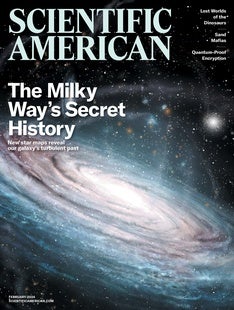 |
| January 23, 2024 |
A startling new application of machine learning: predict when someone might die. A new machine learning model used birth dates, sex, employment, location and use of health care to predict--with up to 78 percent accuracy--the mortality of its test population. Read more about the peculiar way this learning model works in this week's top story. |
| |
 |
| |
| Artificial Intelligence AI Matches the Abilities of the Best Math Olympians Until now computers have failed to solve mathematical problems. But the AI program AlphaGeometry has succeeded in finding proofs for dozens of theorems from the International Mathematical Olympiad | | | | |
| |
| |
| |
| |
| |
| |
| |
FROM THE ARCHIVE
 | | | |
LATEST ISSUES
 |
| |
| Questions? Comments?  | |
| Download the Scientific American App |
| |
| |




















